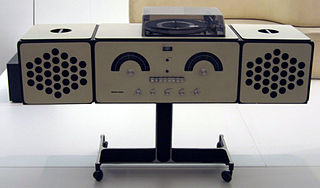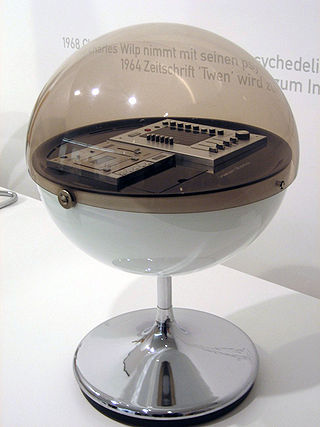- Music centre
-
A music centre (or center) is a type of integrated audio system for home use, used to play from a variety of media. The term is usually used for lower end or sub-high fidelity or hi fi equipment. The term itself has been in use since the 1970s, though in more recent times the terms mini, micro or midi hi-fi, or integrated hi-fi have been preferred. The distinguishing feature compared to high-end equipment is that there is usually only one main unit, with maybe a pair of detachable or separate loudspeakers, though some equipment also has these built in to the main unit.
Integrated audio equipment has a long history, beginning with the integration of the record player and the wireless receiver. Such units were usually called radiograms or stereograms. Very often these were designed as items of household furniture, with a large wooden cabinet on legs. These units were originally monaural, and featured a single integrated loudspeaker in the main body of the cabinet. By the 1960s these units had become smaller, and had developed to include stereophonic reproduction. The necessity of having suitable separation of the speakers meant that the single cabinet designs evolved into three-box designs, and the main box could become much smaller. By the beginning of the 1970s systems were starting to be made of plastic and other materials rather than wood.
The 1970s saw the inclusion of a deck for playing compact cassettes as well as a record player and receiver, and the term music centre came into common use. The inclusion of a turntable capable of playing full-sized gramophone records tended to dictate the overall size of these units, which remained relatively large. The cassette component was either a top-loading unit beside the turntable or a front-loading unit mounted on a deeper front panel. By the end of the decade, the first very small systems started to appear, which dropped the integrated record player in order to reduce the size of the other components significantly. Other innovations such as electronic control of the cassette transport mechanism (as opposed to direct mechanical operation) allowed further size reductions.
The compact disc appeared in the early 1980s and the integrated hi-fi system came into its own, because the small size of a CD player compared to a turntable meant that this function could be reintegrated into the main unit without compromising its small size. The cassette remained a standard part of these systems until the late 1990s, where it was gradually eliminated in favour of other technologies such as the Minidisc.
The music centre has always been rather looked down upon by the hi-fi enthusiast. In the early days the sound quality was far below what was possible using separate components. The main compromise is in the area of the loudspeakers, where small size is favoured over the ability to reproduce an extended low frequency response. Modern equipment has improved in this respect, and such systems are popular. There are still some compromises in terms of what components are used within the integrated unit, compared to what could be fitted in a set of separates, but the differences are smaller than they used to be.
The market for these systems is probably now larger than that for "true" hi-fi. Small units take up less space, and are more suitable in urban areas.
Categories:
Wikimedia Foundation. 2010.



